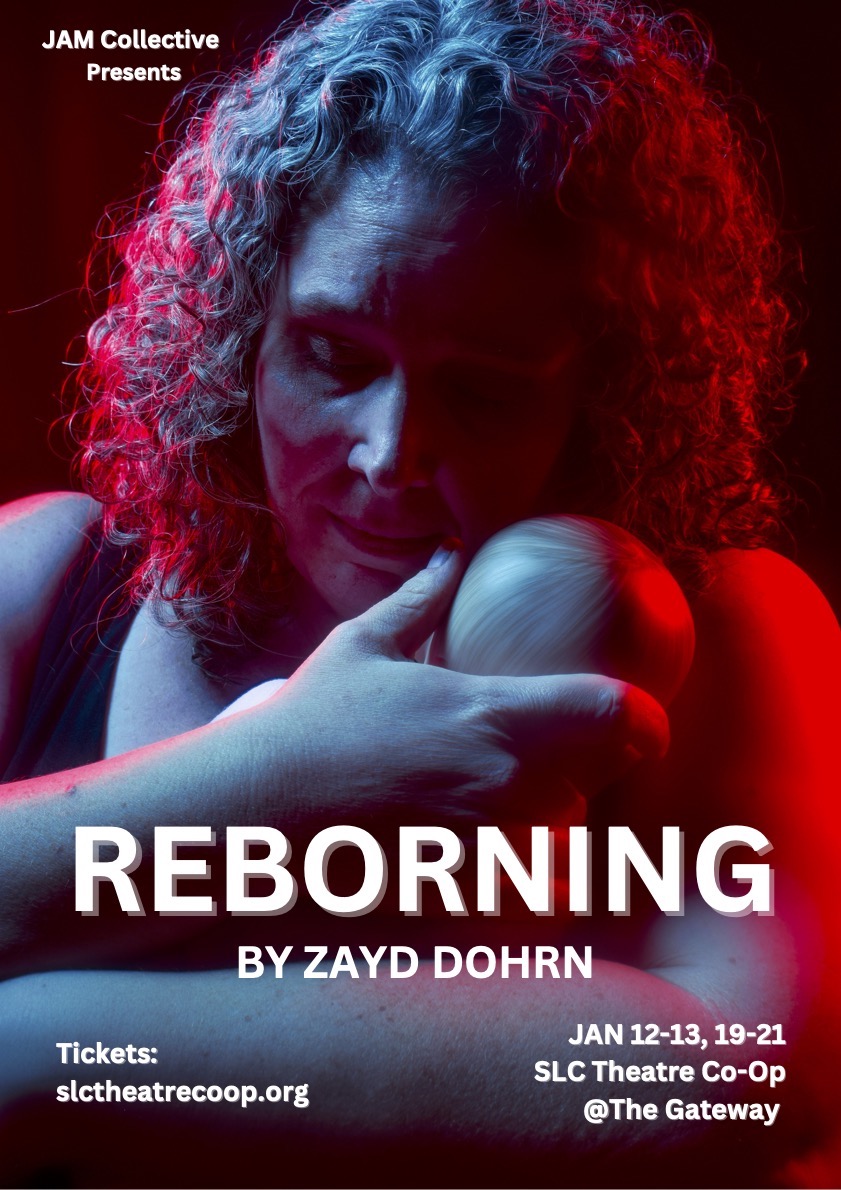SALT LAKE CITY — Reborning, by Zayd Dohrn, is a play about motherhood, unresolved familial trauma and how people cope (or don’t) with their trials.

In Reborning, Kelly runs a business painting dolls to resemble women’s dead babies. One of her customers, Emily, is unhappy about some of the smaller details of her doll and asks Kelly to make some changes. During the initial visit, Kelly reveals that she had been tortured as an infant with her fingertips burned off and multiple stab wounds committed by her parents. Although eventually discovered, and subsequently adopted by a surgeon in Hartford, she still has a lot of lingering trauma from her experience. Emily’s coping mechanisms are revealed throughout the play when her boyfriend, Daizy, tries to determine what is ailing her because they have not had sex in a month, and Emily begins to behave erratically.
The play opens with music, as Kelly (played by Abigail Watts) comes out to the living room to work at a desk. There is a doll’s head under a very bright lamp, and her camera is turned on to record herself working. The set, designed by Jordan Briggs, Abigail Watts, and McKell Rae is fully functional and feels so real. Off to the right of the set there is a large sheet meant for the projection (done by Jordan Briggs) of anything the phone records. So the audience gets an alternative, more intimate, look at what can also be seen by looking at the actors. Multimedia portion is a guilty pleasure for me. Any play that can creatively integrate technology in real time is a massive bonus.

Sound (designed by McKell Rae) is a constant throughout the performance. There is music during scene transitions, and static or other eerie noises from the speaker at key moments. Rae’s sound design contributes to the strong realism. For example, Emily (played by Liz Golden) is introduced when she buzzes to get let into Kelly and Daizy’s (played by Jordan Briggs) apartment. It feels so lifelike to watch the mundane ritual of having a visitor arrive. Another notable feature of the play is the lighting (designed by Emma Belnap), which featured strong changes with each new scene and background lamps with ominous red lights that never turned off. Likewise, the costumes (designed by Lydia Curtis) for each character mesh nicely with the other realistic designs. Plus, they help convey the passage of time; as the play progresses, characters slip into pajamas, walk around their apartment in their socks, and wear different clothes the next day. These wardrobe changes were more acute for Emily, whose outfits were more eye-catching than the clothes for Daizy and Kelly.
The realism of the play is most notable in Golden’s performance, which shows a wide range of talent. Watts, meanwhile, seems to oscillate between varying levels of irritation, while Briggs’s sarcasm is undercut by Daizy’s genuine concern for his girlfriend, Kelly. But Golden is the standout, able to smoothly transition into various emotional reactions, such as when Emily cries while recounting the story of how she lost her daughter, a moment that ends with Emily’s frustration at the others’ reaction to her. In a way, Reborning felt full of life, thanks to Rae’s direction. Characters constantly talking, moving around or music playing, which felt contrary to the nature of Emily’s business.

However, it is difficult to watch Reborning without thinking, “Why doesn’t Emily receive any ongoing therapy?” That is probably why there is a throwaway line when Daizy threatens to send Kelly back to inpatient care. Emily and Daizy’s relationship is not necessarily contentious, but they only share one (or two) moments of physical intimacy, and spend the rest of the time bickering. It’s also clear that Kelly is emotionally unavailable, and hasn’t dealt with what happened to her as an infant, but the script does not explain why Daizy wants to have children with her when she has explicitly stated she does not want them or trust herself with them.
The only drawback to this performance was all the distracting noise coming from the business next door. At multiple points, it felt like I was being drawn out of the play listening to random people laughing and music bleeding into the show.
Overall, Reborning is a gentle look into the ways women do — or don’t — learn to cope with trauma. The play has many comedic moments (all from Daizy), and it is a very immersive experience to watch these people’s lives intersect in unexpected ways.
[box]The JAM Collective production of Reborning plays Fridays through Saturdays at 10 PM through January 21 at the SLC Theatre Co-op (167 South Rio Grande Street, Salt Lake City). Tickets are $10. For more information, visit slctheatrecoop.org.[/box]

